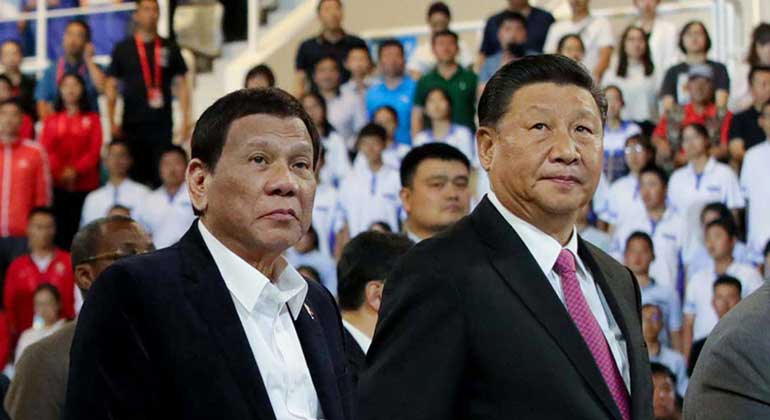
By Gillian M. Cortez, Reporter
PRESIDENT Rodrigo R. Duterte’s tougher stance on China might be a case of being too little, too late, according to political analysts.
It took the tough-talking Mr. Duterte four years to give his most forceful defense of a 2016 United Nations (UN) ruling favoring the Philippines in a sea dispute with China, which is unlikely to be enforced with only two years before he steps down, they said.
“We don’t have the strength to assert the position,” Ramon C. Casiple, executive director at Institute for Political and Electoral Reform, said by telephone on Sunday. “We can’t resolve this within the next two years.”
In a speech before the UN General Assembly last week — his first since since coming to power four years ago — Mr. Duterte said the arbitral award was now “part of international law, beyond compromise and beyond the reach of passing governments to dilute, diminish or abandon.”
“We firmly reject attempts to undermine it,” he said of the arbitration ruling that rejected China’s claim to more than 80% of the South China Sea, without naming China. His successor, Benigno SC. Aquino III, started the lawsuit.
Mr. Duterte had sought closer trade and investment ties with China since he came to power in 2016, including potential joint explorations for oil and gas in the South China Sea.
The Philippine leader had years to push a tougher policy on China, but he probably has run out of time, said Maria Ela L. Atienza, a political science professor from the University of the Philippines.
“It’s only lip service,” she said in a phone interview. “We waited four years for this to happen. We can’t expect any changes now in how the Philippines deals with China.”
Presidential spokesman Harry L. Roque did not immediately reply to a text message seeking comments.
The presidential palace last week said there was no need to enforce the Hague ruling because it’s now part of international law.
“You do not enforce an arbitral ruling,” Mr. Roque told an online news briefing. “The assumption in international law is that all countries will comply with their international obligations particularly with the arbitral award because it freely consented to the jurisdiction of the arbitral tribunal,” he added.
“We will move on matters that we could move forward on including trade and investments,” he said. “We will, for the time being, set this aside because I don’t think the resolution of the territorial dispute is forthcoming in our lifetime.”
Burt Ms. Atienza said the UN ruling is not self-executory and must be observed through diplomatic negotiations.
The world is also too busy dealing with a coronavirus pandemic that has sickened more than 33 million and killed almost a million people, she said. “We can’t expect much within the next two years because the pandemic would probably continue until a vaccine is found.”
Renato C. De Castro, an International Studies professor from De la Salle University, noted that unlike the Philippines, countries such as Indonesia and Malaysia have used the 2016 ruling to defend their sovereignty against China.
“You should put your money where your mouth is,” he said by telephone, referring to Mr. Duterte. Having announced what seemed to be a tougher stance on the sea dispute with China, the President must now follow through with concrete actions, he added.
The first step is for the Philippines to submit its baseline map of the West Philippine Sea — areas of the South China Sea within its exclusive economic zone — to the United Nations, Mr. de Castro said.
“This is similar to what Malaysia and Indonesia did,” he said. “With that, you are submitting your claim to the United Nations Convention on the Law of the Sea and defining your baseline.”
The UN tribunal in 2016 ruled that China’s claim of historic rights to resources within the sea falling within the ‘nine-dash line’ was illegal.
The court said the Philippines could declare certain areas of the sea as part of its exclusive economic zone because these areas do not overlap with any entitlements claimed by China.
Certain Chinese actions within the Philippines’ exclusive zone violated its sovereign rights and were unlawful, the court said. It added that China’s island-building activities in the disputed waterway had caused severe environmental harm in violation of international conventions.
Activists last week said Mr. Duterte’s 360-degree turn was a big victory for international law and Philippine sovereignty against his own defeatist policy on China.
Albert del Rosario, the country’s top diplomat when the Aquino government filed the lawsuit in 2013, has said Mr. Duterte should strive to get the support of more countries in getting the award enforced.
